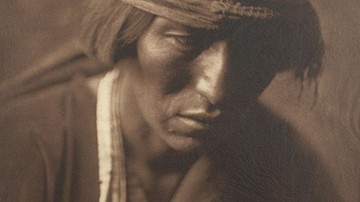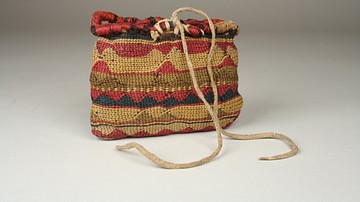Search
Search Results

Image
Hastobíga, a Hataałii (Navajo Medicine Man)
Hastobíga, a Navajo Hataałii ("medicine man"), photograph by Edward S. Curtis, 1904.
Smithsonian Libraries and Archives, Washington, D.C.

Image
Medicine Bundle
Winnebago Medicine Bundle, Nebraska, United States, 1850-60.
Metropolitan Museum of Art, New York.

Article
Mulan: The Legend Through History
Mulan (“magnolia”) is a legendary character in Chinese literature who is best known in the modern day from the Disney filmed adaptations (1998, 2020). Her story, however, about a young girl who takes her father's place in the army to help...

Definition
Yin and Yang
The principle of Yin and Yang from Chinese philosophy is that all things exist as inseparable and contradictory opposites. Examples of Yin-Yang opposite forces are female-male, dark-light, and old-young. The pairs of equal opposites both...

Article
The Seven Voyages of Zheng He
Admiral Zheng He (aka Cheng Ho, c. 1371-1433 CE) was a Chinese Muslim eunuch explorer who was sent by the Ming dynasty emperor Yongle (r. 1403-1424 CE) on seven diplomatic missions to increase trade and secure tribute from foreign powers...

Video
Roman Medicine: An Overview
This video is a brief description and overview of ancient Roman medicine.

Video
A History of Medicine in Ancient Greece and Rome
In this video, Dr. Maria Vlachaki presents a lecture on the history of medicine in ancient Greece and Rome

Article
Ancient Egyptian Medical Texts
Medicine in ancient Egypt was understood as a combination of practical technique and magical incantation and ritual. Although physical injury was usually addressed pragmatically through bandages, splints, and salves, even the broken bones...

Definition
Yongle Emperor
The Yongle Emperor (aka Chengzu or Yung Lo, r. 1403-1424 CE) was the third ruler of the Chinese Ming Dynasty (1368-1644 CE). Inheriting a stable state thanks to the work of his father, the Hongwu Emperor (r. 1368-1398 CE), Yongle made lasting...

Definition
Simon Forman
Simon Forman (1552-1611) was an Elizabethan physician, astrologer, magician, and alchemist who lived and worked in both London and Wiltshire, England. He was unusual in that despite receiving no formal training in medicine or astrology, and...